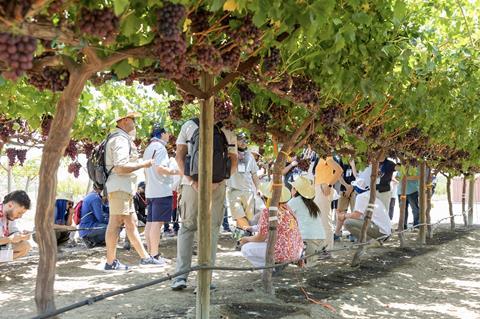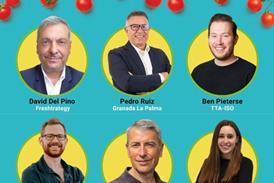Global field days to view vineyards and new cultivars are important for South Africa’s table grape growers
Every July and August, South African table grape growers head across the oceans to see what is new in the field of table grape cultivars.

These visits help producers to decide what they should plant to achieve a sustainable future.
In recent years the cost of investment in new vineyards has increased dramatically, and the long-term viability of new varieties and vineyards is vitally important for survival in the industry.
“In the past we took massive risks with new cultivars, often having to pull them out after three years after what we thought were excellent new varieties, did not perform,” Anton Viljoen, a prominent Hex River Valley grower, previously told Fruitnet.
The invitations to field days in the US and Spain during the northern summer have therefore carried extra significance this year. Growers also visited table grape producers around the Mediterranean to see how new cultivars are doing there.
Both South Africa and Namibia participated in July visits to breeding programmes in the US and they came back with the same message – while there are some great new cultivars in the pipeline, there is still a long way to go before they can be planted with confidence.
Capespan Namibia’s Kobus Bothma, Niёl Kirsten of JDK in Paarl and Marinus Naude of Denau Farms in the Hex Valley were some of those who engaged with the new cultivar journey this year.
They were impressed with what they saw but say the real work starts now.
“We need to see how these varieties perform under our own micro-conditions. The first step is to get them planted in trial vineyards on our farms – and that takes some time,” was the message.
They say breeding and releasing new branded varieties is not the end of the game, and also note that it takes time to build confidence in the various breeding programmes and the systems they apply.
“Confidence is created when new cultivars perform well under local conditions without further manipulation in the vineyards,” commented Kirsten. ”It is perhaps true to say that some breeders are more successful in this respect than others.”
“As part of being the exclusive territorial agent for the commercialisation of the Arra varieties and Early Sweet in Southern Africa, TopFruit annually attends the Arra Field Days in Bakersfield,” said AJ Jansen van Vuuren, table grape manager of TopFruit.
“This year, Andre Agenbag, Viticulturist in the Northern Cape and Namibia and I hosted numerous visitors from South Africa and Namibia, and the interactions with them were excellent,” van Vuuren noted, adding that cultivars such as Arra Honey Pop, the red Arra Fire Kiss and the black variety Arra Mystic Charm attracted attention.
Sun World varieties also featured strongly at its own field days, and the company says It was clear from the discussions that growers are seeking early varieties that perform well.
“Fortunately, we have the varieties to offer, not only for the early packing windows but also for the later ones,” says the group’s Danê Joubert. ”These varieties are gaining a lot of interest from growers and exporters. and are now well-accepted in most major markets, gaining good momentum.
“Yes, the climate, soil, growing conditions and growing practices are entirely different in different countries, but you can still get a good idea of how the varieties will perform in your region,” Joubert notes. ”Our visitors consisted of growers, exporters, and nurseries, all of whom capitalised on the opportunity at hand.”
Kobus Bothma says that with Sun World varieties now also available to Namibian growers, producers there also now have different options.
“We will see how this develops in the future,” he says.
While there has been a recent realignment in the world’s breeding programmes, growers must still make sense of the large number of varieties on offer to them.






